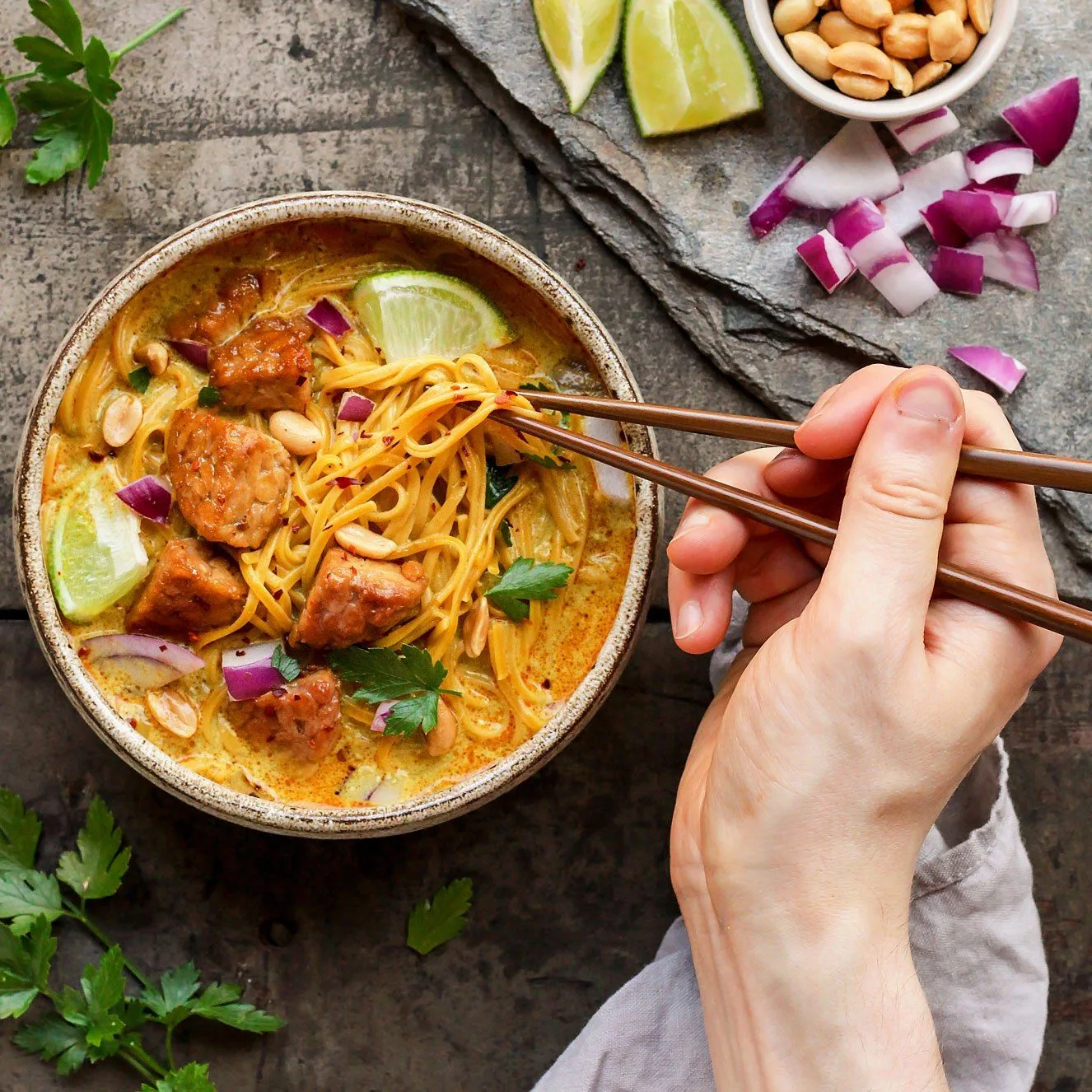Welcome to Our Thai Coconut Curry Soup Recipe!
Hello, food enthusiasts! We’re thrilled to have you here. If you love bold flavors and exotic dishes, you’re in for a treat. Today, we’re diving into the world of Thai cuisine with a delightful Thai Coconut Curry Soup recipe, perfect for any occasion. Using high-quality ingredients from Costco, this recipe is designed to be both delicious and easy to prepare. So, put on your apron, gather your ingredients, and let’s create something extraordinary together!
If you’re a fan of exotic and flavorful dishes, Thai Coconut Curry Soup is a must-try! Costco offers a variety of ingredients that make this soup both delicious and convenient to prepare at home. This blog will guide you through the process of creating an authentic Thai Coconut Curry Soup using ingredients you can find at your local Costco.
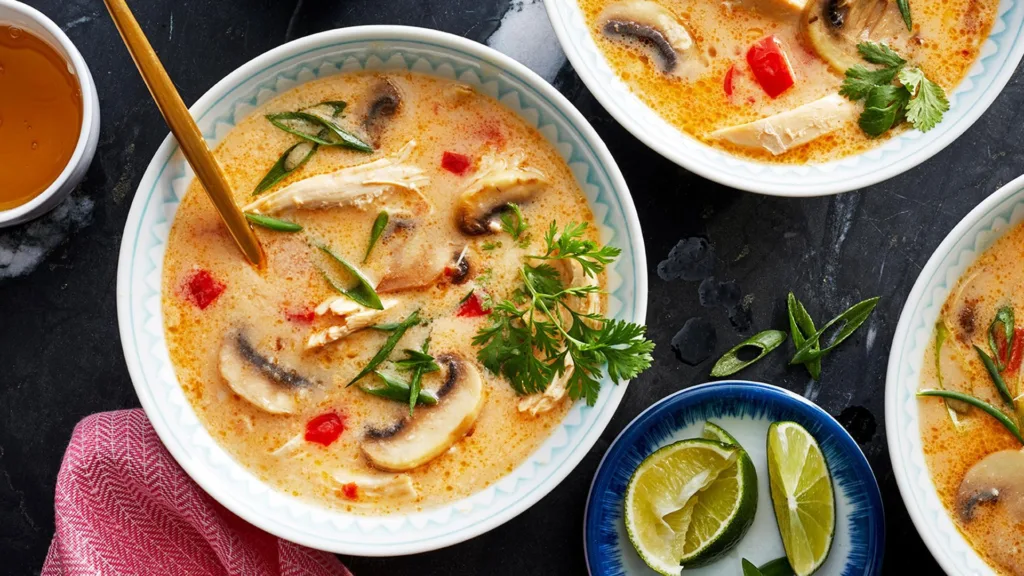
Key Takeaways
- Delicious and Nutritious: This Thai Coconut Curry Soup is both flavorful and nutrient-rich, combining the goodness of coconut milk, chicken, and fresh vegetables.
- Costco Convenience: All ingredients can be easily found at Costco, ensuring quality and affordability.
- Customizable: Easily adjust the recipe to fit your preferences by varying the protein, vegetables, and spice levels.
- Simple Preparation: Step-by-step instructions make this recipe easy to follow, even for beginners.
- Versatile and Flexible: This soup can be adapted to vegetarian or seafood versions, and pairs well with rice, spring rolls, and salads.
- Storage-Friendly: Refrigerate or freeze leftovers for convenient meals throughout the week.
Enjoy creating this delicious Thai Coconut Curry Soup with ingredients from Costco and delight in a dish that’s as versatile as it is tasty!
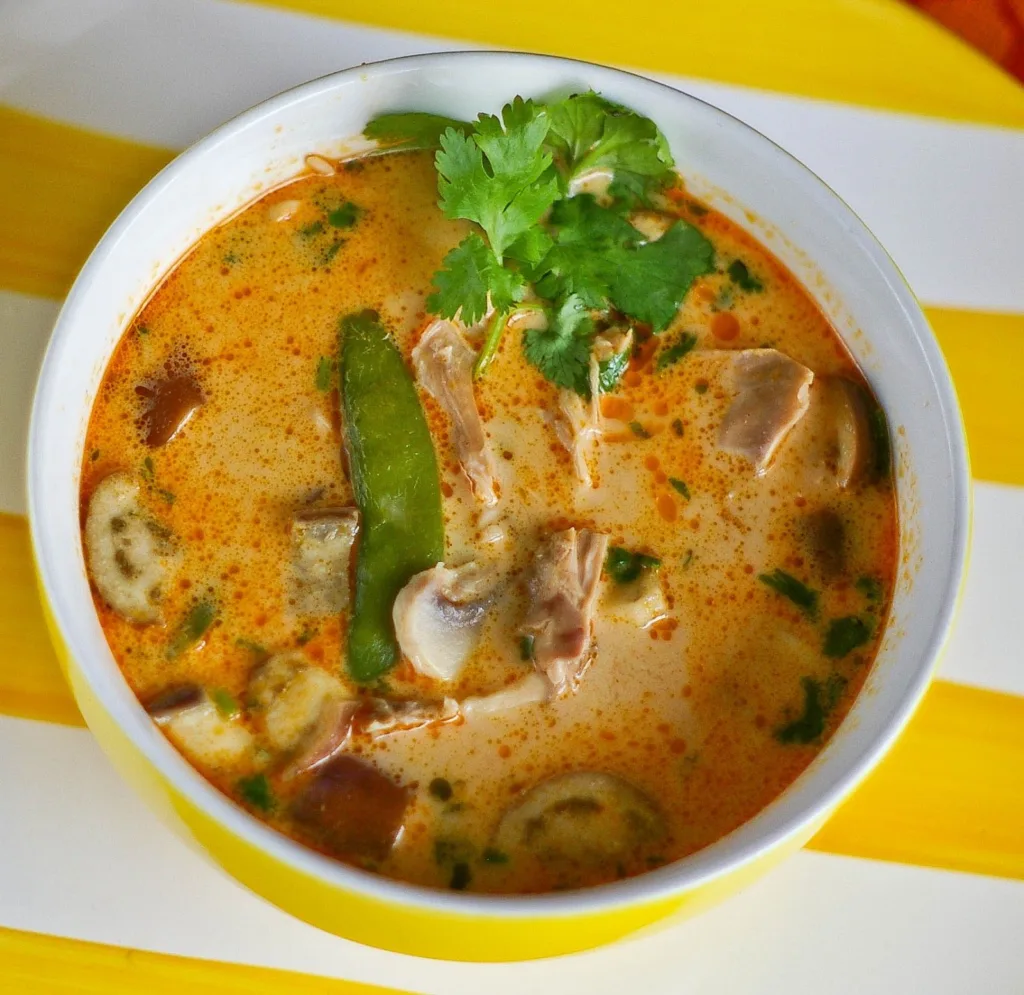
Understanding the Origins and History of Thai Coconut Curry Soup
Thai Coconut Curry Soup, known as Tom Kha Gai in Thailand, is a dish that beautifully reflects the rich culinary heritage of Thai cuisine. The name “Tom Kha Gai” translates to “boiled galangal chicken,” highlighting the significance of galangal (a root similar to ginger) and chicken as key ingredients.
Historical Context
The roots of this soup trace back to central Thailand, where traditional Thai cooking often incorporates a balance of sweet, sour, salty, and spicy flavors. Coconut milk is a staple in Thai cuisine, used to add creaminess and depth to many dishes. The introduction of curry paste, influenced by Indian and Malay cuisines, brought a fusion of aromatic spices that enhanced the flavor profile of the soup.
Cultural Significance
Thai Coconut Curry Soup is more than just a dish; it is a cultural symbol of Thailand’s rich culinary tradition. The use of fresh herbs like lemongrass, kaffir lime leaves, and cilantro showcases the emphasis on fresh ingredients in Thai cooking. Each bowl of this soup tells a story of local ingredients and age-old techniques passed down through generations.
Modern Adaptations
While the traditional recipe remains popular, modern adaptations have emerged to cater to various dietary preferences. Today, you can find vegetarian versions with tofu and vegetable broth, as well as seafood variations featuring shrimp or fish. These adaptations retain the essential flavors while offering flexibility to home cooks.
Global Popularity
The global popularity of Thai Coconut Curry Soup can be attributed to its delicious taste and health benefits. It has become a beloved dish in many countries, often featured in Thai restaurants worldwide. The use of coconut milk, chicken, and spices creates a comforting yet exotic dish that appeals to a wide range of palates.
Understanding the origins and history of Thai Coconut Curry Soup adds a deeper appreciation for this delightful dish. As you prepare and enjoy your own bowl, you’re not just cooking a meal—you’re participating in a culinary tradition that spans centuries and continents. Happy cooking!
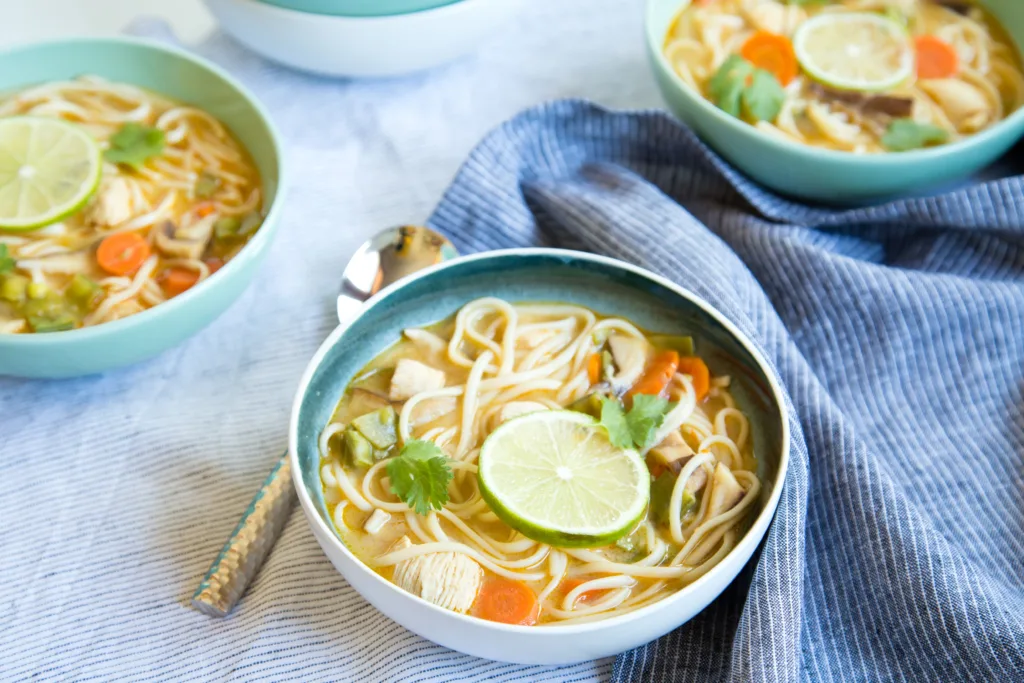
Ingredients You Need from Costco
To make this delightful Thai Coconut Curry Soup, you’ll need the following ingredients, all available at Costco:
| Ingredient | Quantity |
|---|---|
| Coconut Milk | 2 cans (13.5 oz each) |
| Thai Red Curry Paste | 3 tablespoons |
| Chicken Broth | 4 cups |
| Boneless Chicken Breast | 1 pound |
| Fresh Vegetables (Carrots, Bell Peppers, Spinach) | 2 cups (sliced) |
| Fish Sauce | 2 tablespoons |
| Brown Sugar | 1 tablespoon |
| Lime Juice | 2 tablespoons |
| Fresh Cilantro | 1 bunch |
| Rice Noodles | 8 oz |
Instructions
- Prepare the Chicken and Vegetables: Cut the chicken breast into thin slices and the vegetables into bite-sized pieces.
- Cook the Base: In a large pot, heat a tablespoon of oil over medium heat. Add the Thai red curry paste and cook for 1-2 minutes until fragrant.
- Add the Liquids: Pour in the chicken broth and coconut milk. Stir to combine, bringing the mixture to a simmer.
- Cook the Chicken and Vegetables: Add the sliced chicken and vegetables to the pot. Cook for about 10 minutes or until the chicken is cooked through and the vegetables are tender.
- Season the Soup: Stir in the fish sauce, brown sugar, and lime juice. Adjust the seasoning to taste.
- Prepare the Noodles: Cook the rice noodles according to the package instructions. Drain and set aside.
- Serve: Place a portion of rice noodles in each bowl, ladle the soup over the noodles, and garnish with fresh cilantro.
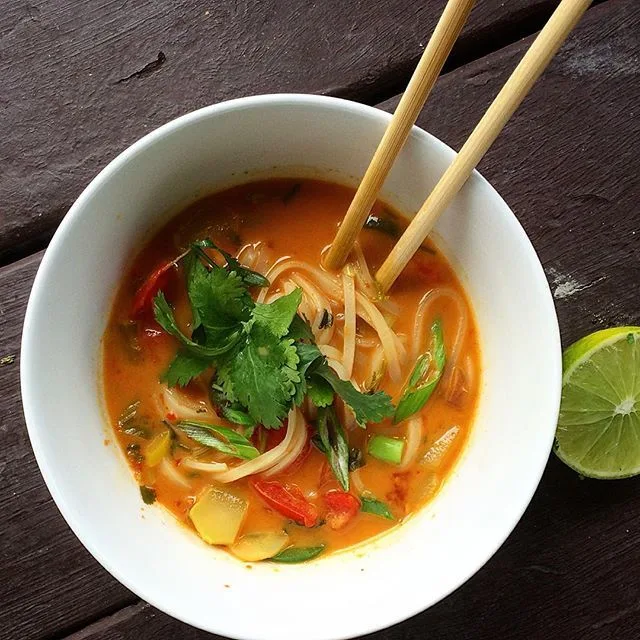
Tips for Perfect Thai Coconut Curry Soup
- Adjust Spiciness: If you prefer a milder soup, reduce the amount of Thai red curry paste.
- Vegetarian Option: Substitute chicken with tofu and use vegetable broth instead of chicken broth for a vegetarian version.
- Extra Flavor: Add a splash of soy sauce or a dash of hot sauce to enhance the flavors further.
Why Choose Costco for Ingredients?
Costco provides high-quality ingredients at bulk prices, making it an economical choice for cooking delicious meals at home. Their fresh produce and premium products ensure that your Thai Coconut Curry Soup will be both flavorful and nutritious.
Creating a delicious Thai Coconut Curry Soup is simple and satisfying, especially with the right ingredients from Costco. This recipe is perfect for those who enjoy bold flavors and a hint of spice, making it a delightful meal for any day of the week. Enjoy this savory and aromatic soup with family and friends!
Bon Appétit!
Nutritional Benefits of Thai Coconut Curry Soup
Thai Coconut Curry Soup is not only delicious but also packed with nutritional benefits:
- Coconut Milk: Rich in healthy fats, vitamins C, E, B1, B3, B5, and B6, and iron.
- Chicken: A great source of lean protein.
- Vegetables: Carrots, bell peppers, and spinach provide essential vitamins and minerals, including vitamins A, C, and K, and dietary fiber.
- Cilantro: Adds fresh flavor and is rich in antioxidants and vitamins A, C, and K.
- Lime Juice: Provides a boost of vitamin C and enhances the flavor of the soup.
Customizing Your Thai Coconut Curry Soup

One of the best things about this soup is its versatility. Here are some ideas to make it your own:
Protein Variations
- Shrimp: Substitute chicken with shrimp for a seafood twist.
- Tofu: For a vegetarian or vegan option, use tofu instead of chicken
and vegetable broth instead of chicken broth.
Vegetable Additions
- Mushrooms: Add sliced mushrooms for an earthy flavor.
- Zucchini: Include zucchini for added texture and nutrition.
- Bamboo Shoots: For a more authentic Thai flavor, add bamboo shoots.
Flavor Enhancements
- Kaffir Lime Leaves: These add a distinct citrus aroma to the soup.
- Lemongrass: Use fresh lemongrass stalks to infuse a lemony fragrance.
- Galangal: A root similar to ginger, galangal adds a unique, peppery flavor.
Cooking Tips
- Simmer Gently: To keep the coconut milk from curdling, simmer the soup gently and avoid boiling.
- Taste and Adjust: Always taste your soup before serving and adjust the seasoning. Add more lime juice for acidity, fish sauce for saltiness, or sugar for sweetness.
- Prep Ahead: Chop vegetables and proteins in advance to save time when cooking.
Serving Suggestions
Thai Coconut Curry Soup is a hearty dish that can be enjoyed on its own or paired with side dishes for a more elaborate meal:
- Rice: Serve the soup with a side of steamed jasmine rice to soak up the delicious broth.
- Spring Rolls: Complement the soup with fresh or fried spring rolls for added crunch.
- Salad: A light Thai cucumber salad can balance the rich flavors of the soup.
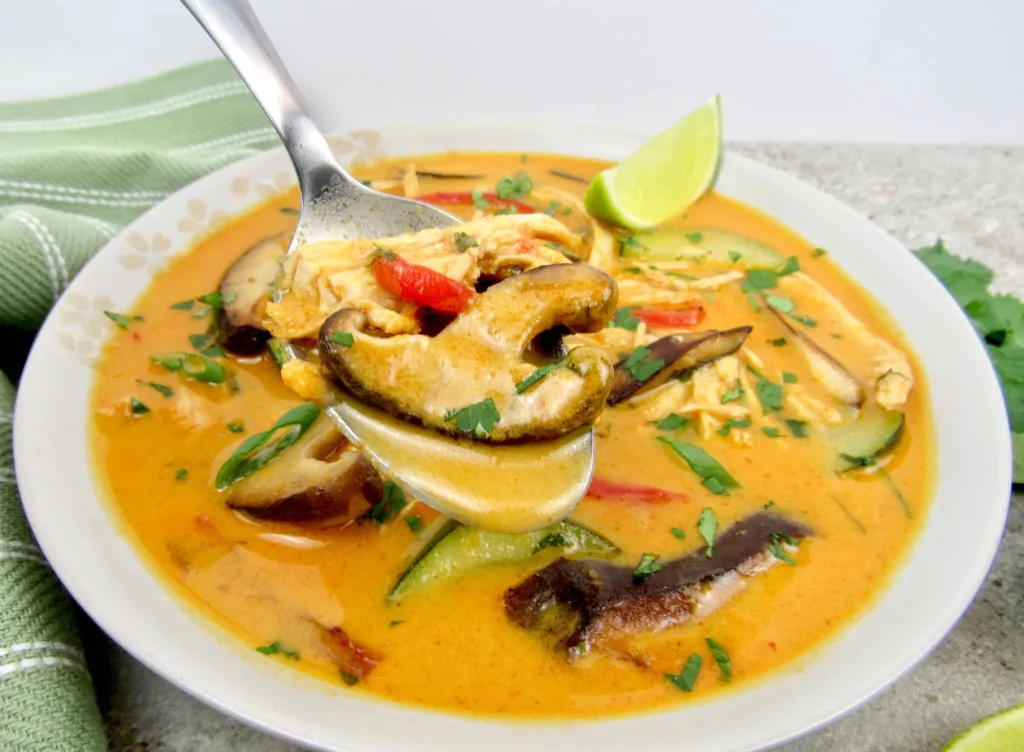
Storing and Reheating
This soup stores well and can be enjoyed as leftovers:
- Refrigeration: Store the soup in an airtight container in the refrigerator for up to 3 days.
- Freezing: For longer storage, freeze the soup in individual portions for up to 3 months. Thaw in the refrigerator overnight before reheating.
- Reheating: Reheat the soup gently on the stove over low heat, stirring occasionally. Avoid boiling to maintain the texture and flavor.
Conclusion
Making Thai Coconut Curry Soup at home using ingredients from Costco is a delightful and economical way to enjoy this exotic dish. With its rich, creamy coconut base, tender chicken, and fresh vegetables, this soup is perfect for a cozy meal any time of the year. The ease of preparation and the versatility of ingredients allow you to customize it to your taste and dietary preferences. So next time you’re at Costco, gather these ingredients and treat yourself to a bowl of this flavorful Thai delight!
Enjoy your cooking and happy eating!
Also Read:- https://princeblog.in/delicious-chicken-alfredo-pasta-recipe/
Tips for Perfect Thai Coconut Curry Soup
Creating a delicious Thai Coconut Curry Soup can be simple and enjoyable with these helpful tips:
1. Use Fresh Ingredients
Fresh ingredients make a big difference in the flavor of your soup. Opt for fresh vegetables, herbs, and high-quality chicken to enhance the taste.
2. Balance the Flavors
Thai cuisine is all about balancing sweet, salty, sour, and spicy flavors. Taste your soup frequently and adjust the seasoning with fish sauce, lime juice, and sugar to get the perfect balance.
3. Don’t Boil the Coconut Milk
Coconut milk can separate if boiled. Simmer gently to maintain a smooth and creamy texture.
4. Customize Your Spice Level
Adjust the spiciness by adding more or less Thai red curry paste. If you prefer a milder soup, start with less paste and gradually add more to taste.

5. Prepare Ingredients Ahead of Time
Chopping vegetables and slicing chicken beforehand can make the cooking process quicker and more enjoyable. This ensures you can focus on cooking without interruptions.
6. Garnish for Extra Flavor
Add a fresh touch by garnishing your soup with chopped cilantro, green onions, or a squeeze of lime juice right before serving.
7. Use Quality Broth
A good quality chicken broth can elevate your soup’s flavor. If possible, use homemade broth or a high-quality store-bought option.
8. Experiment with Add-Ins
Feel free to add extra ingredients like mushrooms, bamboo shoots, or even baby corn to customize your soup. These additions can provide more texture and variety.
9. Serve Immediately
Thai Coconut Curry Soup is best enjoyed fresh and hot. Serve immediately after cooking to enjoy the optimal flavor and texture.
10. Store Properly
If you have leftovers, store them in an airtight container in the refrigerator for up to three days. Reheat gently on the stove to avoid curdling the coconut milk.
By following these tips, you can ensure your Thai Coconut Curry Soup is not only delicious but also perfectly balanced and beautifully presented. Enjoy your cooking experience!
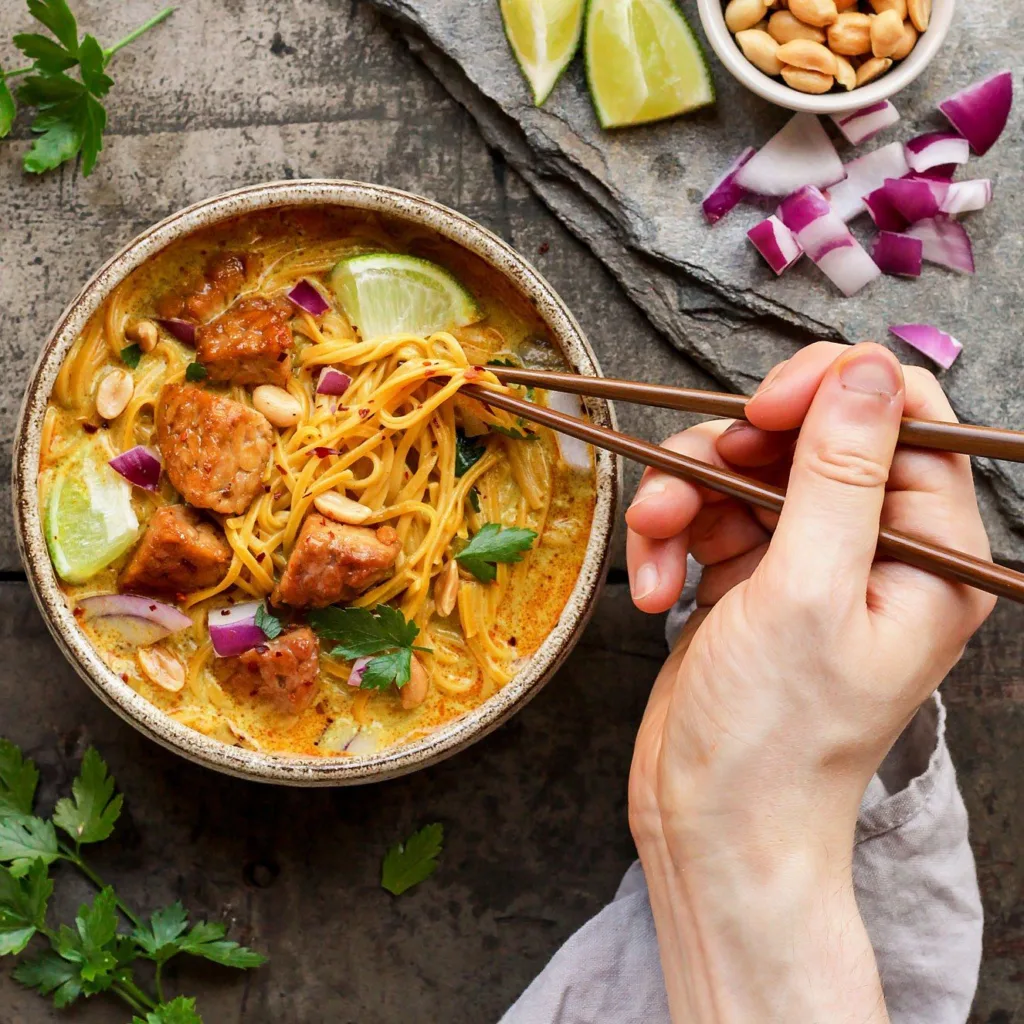
Safety Tips for Cooking Thai Coconut Curry Soup
When preparing Thai Coconut Curry Soup, keeping safety in mind is crucial to ensure a smooth and enjoyable cooking experience. Here are some essential safety tips:
1. Handle Knives with Care
Always use sharp knives and handle them carefully to avoid accidents. Cut ingredients on a stable cutting board and keep your fingers tucked under to prevent cuts.
2. Cook Chicken Thoroughly
Ensure the chicken is fully cooked to avoid foodborne illnesses. The internal temperature of the chicken should reach at least 165°F (75°C).
3. Prevent Cross-Contamination
Keep raw chicken separate from other ingredients. Use separate cutting boards and utensils for raw meat and wash your hands thoroughly after handling it.
4. Monitor the Stove
Never leave the stove unattended while cooking. Keep an eye on your soup to prevent boiling over or burning, and adjust the heat as needed.
5. Use Heat-Resistant Utensils
Use utensils that can withstand high temperatures, such as silicone or wooden spoons. Avoid using plastic utensils that can melt when exposed to heat.
6. Beware of Hot Liquids
Be cautious when adding ingredients to hot liquids, as they can splash and cause burns. Add liquids slowly and stir gently to avoid splattering.
7. Handle Hot Pots with Care
Use oven mitts or pot holders when handling hot pots and pans. Ensure that pot handles are turned inward to prevent accidentally knocking them over.
8. Store Ingredients Safely
Refrigerate perishable ingredients like chicken and coconut milk promptly. Keep them at the proper temperature to prevent spoilage and bacterial growth.
9. Avoid Overfilling the Pot
Leave enough space in the pot for the soup to simmer without spilling over. Overfilling can cause dangerous splashes and messes.
10. Properly Store Leftovers
Cool leftovers quickly and store them in airtight containers in the refrigerator. Consume within three days, and reheat gently to avoid curdling the coconut milk.
By following these safety tips, you can ensure a safe and enjoyable cooking experience while making your delicious Thai Coconut Curry Soup. Happy cooking and stay safe!

Frequently Asked Questions (FAQ) about Thai Coconut Curry Soup
Here are some common questions and answers to help you perfect your Thai Coconut Curry Soup:
1. Can I Make This Soup Vegetarian or Vegan?
Yes! You can easily make this soup vegetarian or vegan by substituting the chicken with tofu or additional vegetables, and using vegetable broth instead of chicken broth. Ensure that the curry paste you use does not contain fish sauce or shrimp paste.
2. How Can I Adjust the Spiciness?
To adjust the spiciness, simply modify the amount of Thai red curry paste you use. For a milder soup, start with one tablespoon and gradually add more to taste. For a spicier version, you can add extra curry paste or include fresh chili peppers.
3. What Can I Use Instead of Coconut Milk?
Coconut milk is essential for the authentic flavor and creamy texture of this soup. However, if you need a substitute, you can use almond milk or cashew cream, but keep in mind that the flavor will be different.
4. Can I Freeze Thai Coconut Curry Soup?
Yes, you can freeze it! Allow the soup to cool completely before transferring it to airtight containers. Freeze for up to three months. Thaw in the refrigerator overnight and reheat gently on the stove to avoid curdling the coconut milk.
5. What Type of Vegetables Can I Add?
You can add a variety of vegetables to this soup. Common additions include mushrooms, zucchini, baby corn, bamboo shoots, snow peas, and broccoli. Feel free to experiment with your favorites!
6. How Do I Prevent the Coconut Milk from Curdling?
To prevent curdling, avoid boiling the soup once the coconut milk has been added. Simmer gently over low to medium heat and stir occasionally.
7. Can I Use Store-Bought Curry Paste?
Absolutely! Store-bought Thai red curry paste is a convenient and flavorful option. Just ensure it’s a quality brand for the best taste.
8. How Long Will Leftovers Last in the Refrigerator?
Leftovers can be stored in an airtight container in the refrigerator for up to three days. Reheat gently on the stove or in the microwave, stirring occasionally.
9. What Can I Serve with Thai Coconut Curry Soup?
This soup pairs well with steamed jasmine rice, spring rolls, or a light Thai cucumber salad. The rice helps to soak up the delicious broth, making for a satisfying meal.
10. Can I Use Other Types of Protein?
Yes! You can substitute chicken with shrimp, fish, beef, or pork. Adjust the cooking time accordingly to ensure the protein is fully cooked but not overdone.
By addressing these frequently asked questions, you’ll be well-equipped to make a perfect batch of Thai Coconut Curry Soup. Enjoy your cooking experience!
Follw on:- https://www.instagram.com/royal_.princeraj/
